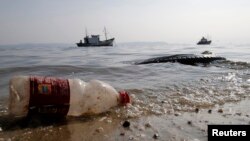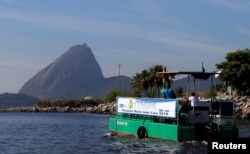RIO DE JANEIRO —
Rio's attempts at cleaning the waters where Olympic sailing events will be held in 2016 are so far behind schedule clean-up efforts are now stop gap rather than lasting, local officials admitted on Thursday.
“Cleaning rubbish from the Guanabara Bay will be a stop gap effort,” said Carlos Portinho, the state's sub-secretary for the environment. “But it's what we have to do.”
Portinho, who took office this week and is charged with cleaning the bay's notoriously fetid waters, criticized the urban districts that surround the bay for contributing to the pollution.
“The municipalities are on the coast of the Guanabara Bay and they don't think the rubbish thrown in the bay is their responsibility,” he said.
Portinho said tenders for seven “ecoboats” that will skim garbage from the water's surface and nine “ecobarriers” designed to stop rubbish from flowing into the bay from tributaries are scheduled to take place this month.
Hundreds of millions of dollars have already been spent on cleaning the bay - much of it from foreign donors - but the situation remains critical.
The bay is an integral part of Rio de Janeiro's topography and skirts large parts of the city, most famously running along Botafogo and Flamengo beaches below Sugarloaf mountain.
Tourists to the city who cross the bay when driving in from the international airport are greeted by a fetid stench. Sailors have expressed disgust at the high level of coliforms and other pollutants.
Reuters reporters who sailed on the bay last month came across all sorts of floating debris, including an old sofa.
When it won the right to host the games back in 2009, Rio promised it would treat 80 percent of the sewage water flowing into the bay by the time the games start in August 2016.
However, almost five years later, only half that target has been reached, said Gelson Serva, the state's waste water coordinator.
The scandal over dirty waters is just one of the problems facing South America's first ever Olympic host city.
Earlier this week, 17 international sporting federations criticized Brazilian authorities for the slow pace of work and a lack of institutional support.
Construction work at a purpose-built complex where eight events will take place has yet to start and the pace of work at others is slow. Workers have been on strike for a week at the Olympic Park, the main cluster of venues.
In spite of the river of bad news, Rio officials maintain that everything is under control and that the Games will be “great.”
“Cleaning rubbish from the Guanabara Bay will be a stop gap effort,” said Carlos Portinho, the state's sub-secretary for the environment. “But it's what we have to do.”
Portinho, who took office this week and is charged with cleaning the bay's notoriously fetid waters, criticized the urban districts that surround the bay for contributing to the pollution.
“The municipalities are on the coast of the Guanabara Bay and they don't think the rubbish thrown in the bay is their responsibility,” he said.
Portinho said tenders for seven “ecoboats” that will skim garbage from the water's surface and nine “ecobarriers” designed to stop rubbish from flowing into the bay from tributaries are scheduled to take place this month.
Hundreds of millions of dollars have already been spent on cleaning the bay - much of it from foreign donors - but the situation remains critical.
The bay is an integral part of Rio de Janeiro's topography and skirts large parts of the city, most famously running along Botafogo and Flamengo beaches below Sugarloaf mountain.
Tourists to the city who cross the bay when driving in from the international airport are greeted by a fetid stench. Sailors have expressed disgust at the high level of coliforms and other pollutants.
Reuters reporters who sailed on the bay last month came across all sorts of floating debris, including an old sofa.
When it won the right to host the games back in 2009, Rio promised it would treat 80 percent of the sewage water flowing into the bay by the time the games start in August 2016.
However, almost five years later, only half that target has been reached, said Gelson Serva, the state's waste water coordinator.
The scandal over dirty waters is just one of the problems facing South America's first ever Olympic host city.
Earlier this week, 17 international sporting federations criticized Brazilian authorities for the slow pace of work and a lack of institutional support.
Construction work at a purpose-built complex where eight events will take place has yet to start and the pace of work at others is slow. Workers have been on strike for a week at the Olympic Park, the main cluster of venues.
In spite of the river of bad news, Rio officials maintain that everything is under control and that the Games will be “great.”






